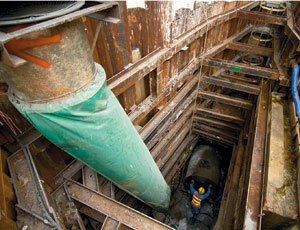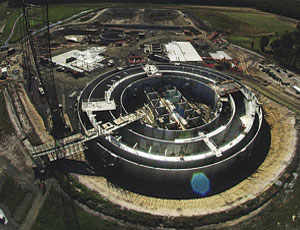The global market for environmental services, already strong thanks to continued infrastructure investments by both developed and developing nations, now has the added driver of addressing increasing threats of water scarcity brought on by climate change and pressure on groundwater supplies. “Urbanization and economic development have always challenged us in finding sufficient supplies of potable water,” says Paul Brown, executive vice president, global market development for Camp Dresser & McKee Inc. (CDM), Lexington, Mass. “Superimposing climate change exacerbates issues that were already quite formidable.”


Experts point to Australia's prolonged drought as an example of how fragile the balance of supply and demand can be. A number of large-scale water and wastewater treatment facilities are under way there aimed at maximizing what is becoming an increasingly precious, yet uncertain resource. For example, CH2M Hill Cos., Denver, is part of an alliance working on the Gippsland Water Factory, an innovative wastewater treatment and recycling system that will treat up to 35 megaliters of domestic and industrial wastewater daily. When the first stage of the project completes in early 2009, the plant will produce approximately 8 megaliters of high-quality recycled water each day for use by local industry.
Wakefield, Mass.-based AECOM Water President Steve Guttenplan notes that Australia’s experience reflects a growing emphasis among nations to adopt a holistic approach to managing their water resources.
“The days of doing a stand-alone water treatment plant are gone. Clients want to look at water resources from soup to nuts so that they can protect and make the best use of it.”
As water use converges with other environmental issues such as energy and natural resource depletion, “There’s less discussion about the term ‘sustainability,’” Guttenplan adds. “It’s now totally understood that’s what we’re doing.”
Dan McCarthy, president and CEO of Black & Veatch’s global water business, says because 10% to 15% of drinking water systems’ energy usage goes to operations and maintenance, “utilities want to do what they can to make those transport systems more efficient.” For example, Black & Veatch has begun design on the 50-million-gallon-per-day Changi NEWater Plant in Singapore, which will be built atop the newly constructed Changi Water Reclamation Plant. The reclamation plant was designed for the addition, minimizing space and pipe requirements.
While the most significant need for water and wastewater infrastructure can be find in rapidly urbanizing areas such as China and India, developed nations from East Asia to Europe also are taking a hard look at their usage patterns. Wastewater treatment plants in these regions are being upgraded to further improve water quality, and collector systems are being improved. For the Wan Chai East and North Point Sewerage Project in Hong Kong, Black & Veatch will upgrade the existing trunk sewerage system as part of an overall sewerage rehabilitation and improvement program.
Staying Afloat
Conractors report that the water and wastewater services sector has so far been largely unaffected by the global economic upheaval.
“Along with improving the standard of living of their populations, governments now fully understand the important role infrastructure plays in helping them compete on a global basis,” says Tom Searle, president of CH2M Hill International. His firm is providing design, supply, installation and commissioning of two 6-mgd reverse-osmosis desalination plants for the Sharjah Electricity and Water Authority in the United Arab Emirates. “Many of them are now looking to get ahead of their curve.”
CDM’s Brown adds that with the combination of lower costs for construction and treatment technology, opportunities for energy savings and coordinated fiscal stimulus from national governments, “we may weather the current economic crisis more successfully than other sectors within our industry.”
Still, the immediate outlook is anything but clear. With nations facing the prospect of smaller revenue streams due to a protracted recession, the flow of new opportunities could stall. “Planned projects will get done eventually, but they could also be have longer build-out schedules,” Brown says.
Remediation’s Rockier Outlook
The economy appears to be having a more volatile effect on the market for remediation services. Robert Weber, group chief executive for AECOM Environment, Westford, Mass., says while the market remains quite large, it also is very fragmented, with opportunities and activity varying from one country to the next. A substantial number of projects are driven by private-sector activity, making clean-up work more susceptible to the whims of the global economy. “Unless a company has strong cash reserves, it is unlikely to do much,” Weber says. “Until credit markets return to a level of stability, there will be limited recovery in sectors driven by real-estate development, and merger-acquisition activity.”
On the other hand, limited growth continues in Eastern Europe, where the newest members of the European Union are addressing groundwater contamination and promoting privatization initiatives. AECOM Environment is performing a site investigation and remediation of a large-scale wood-treatment facility in the Czech Republic that includes soil and sediment removal, surfactant flushing of impacted soils, groundwater recovery and treatment. In Romania, the company is overseeing remediation of waste lagoons associated with historic state-owned refining operations.
Despite the economic uncertainty, opportunities for environmental work are still there. “There remain many private companies and local, provincial, and national governments in a position to spend money on remediation, and [they] intend to do so,” says Weber.


Post a comment to this article
Report Abusive Comment